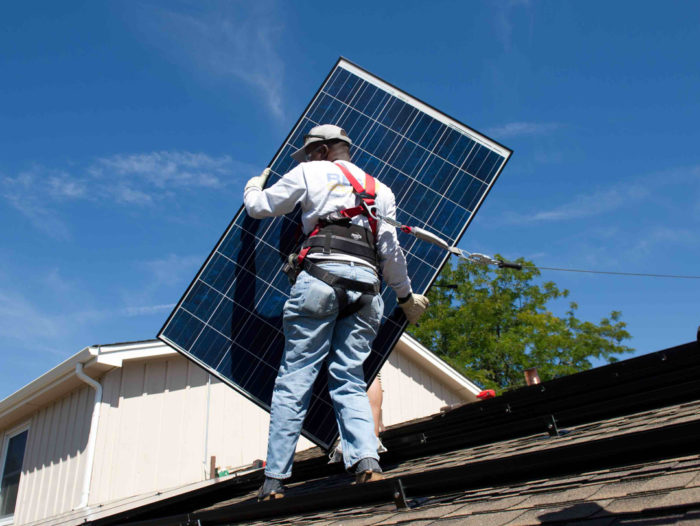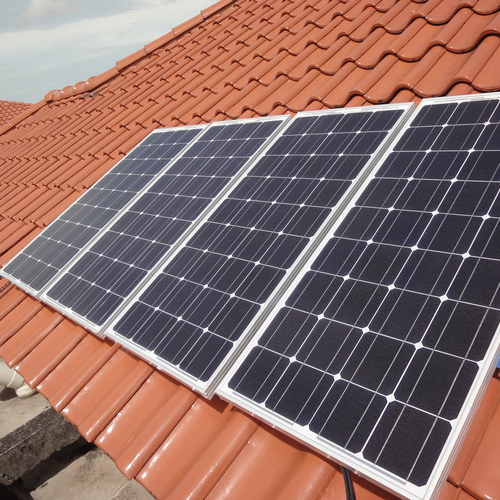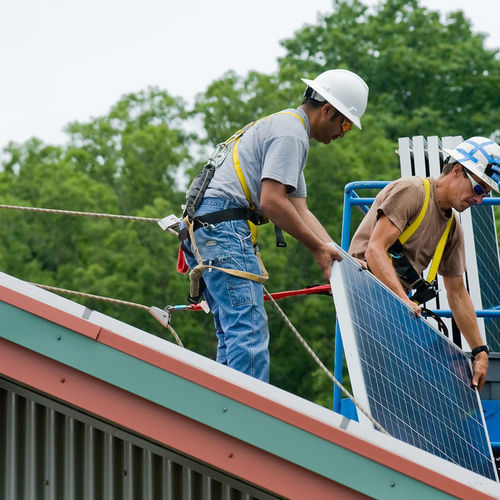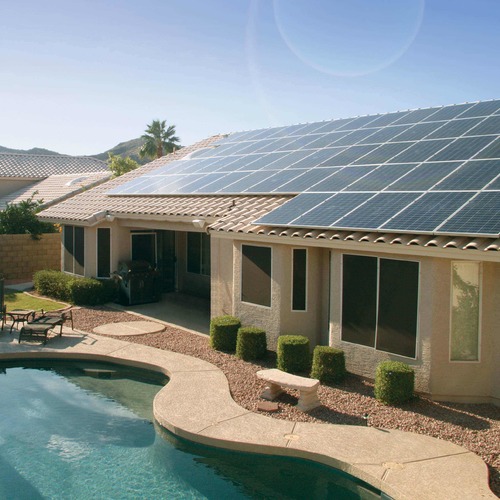
Image Credit: Photo of PV module installation
More than a dozen members of the House of Representatives have asked two federal agencies to look into claims that solar leases are being oversold to consumers, according to published reports.
Last month, Rep. Paul Gosar of Arizona and 11 other House Republicans wrote to the Federal Trade Commission (FTC) with claims that leasing solar panels are potentially harmful investments for homeowners, according to The Daily Signal, an arm of the Heritage Foundation, a conservative, Washington-based think tank.
Separately, four Democratic representatives wrote to the U.S. Consumer Financial Protection Bureau in November with similar concerns, a report in The Arizona Republic said.
Solar leases offer a way for consumers to get some of the benefits of a photovoltaic (PV) system without paying steep upfront costs. Installers put up the panels and then charge homeowners for the electricity they generate, promising lower rates than what their utilities would charge and locked-in costs for the life of the agreement.
“The benefits of solar leasing are huge,” SolarCity promises at its website.
Letter warns of “potentially deceptive sales tactics”
The Republican House members told the FTC that the federal Investment Tax Credit (ITC) and third-party leasing arrangements together have resulted in a surge of PV installations. But, they add, the leasing market may pose a “considerable risk” to consumers who don’t have all the information they need when they sign up.
“Under pressure from Wall Street to sign up more leasing customers before the ITC expires, these companies are reported to be using potentially deceptive sales tactics — practices that, if true, merit investigation,” the letter said.
“Of particular concern,” the letter continues, “is the possibility that these third-party leasing companies may be utilizing marketing strategies that overstate the savings the homeowner will receive, while understating the risks associated with agreeing to a decades-long lease that is often secured by a second deed of trust to the house — a financial commitment that will likely exceed both the life of the roof and the duration of the lessor’s home ownership.”
The representatives cited reports of class action lawsuits in California and Louisiana in which homeowners allege “fraudulent marketing and overstating potential savings.” They also referred the FTC to claims that homeowners signing long-term leases were “struggling to sell their homes, indicating they were not fully aware of the terms of their 20-30 year leases.”
Similar claims from Democrats
In November, according to the Arizona Republic’s account, three Democrats from Arizona plus a House member from Texas raised similar claims with the Consumer Financial Protection Bureau. The four representatives said leasing companies “may be overstating the economic benefits” of signing long-term leases.
The newspaper said the letter asked whether the agency, created in the wake of the housing market collapse and financial meltdown five years ago, has considered giving consumers recommendations about solar leases to protect them from financial harm.
“Customers are quoted savings each month on their utility bills,” the letter said. “However, who calculates those estimations and are they accurate?”
A spokesman for solar installer SolarCity said the company complies with the law and that it uses a standard industry contract. Will Craven also said Arizona’s largest electric utility, Arizona Public Service Company, is known to be lobbying Congress and was probably the source of this “misinformation.”
“SolarCity depends on positive word of mouth to sell our systems,” Will Craven told the newspaper, “and unlike APS, we have to satisfy our customers in order to make money… As a market leader that prioritizes consumer protection, SolarCity looks forward to working with the [Consumer Financial Protection Bureau] and members of Congress on this important issue.”
Weekly Newsletter
Get building science and energy efficiency advice, plus special offers, in your inbox.















4 Comments
SolarCity sales pitches
Another issue is the deceptive information that at least one SolarCity salesperson has provided regarding lease versus purchase. One client of ours was recently told by her SolarCity rep that if she purchased rather than leased, she would not break even until year 17. The truth was that she would in all likelihood break even between year 6 and 7, in her case. My guess is that this was not an isolated (no pun intended) incident.
concern for consumers?
From House GOP members? Call me sceptical.
are leases a good deal?
While shopping for solar in CT I did see a divide between actual solar companies and companies selling a financial product tied to installing solar. As Paul points out before there are companies who really don't want to sell solar systems and I saw 15 year+ payback periods as the starting per/kw cost was way above the market average. The same companies had much more financially attractive lease and loan options, though some drew them all the way out to 20 years which seems excessively long to me.
We ended up buying a system with an 8 year payback in part because that would maximize total savings and we liked the local company. For those who don't want to own, a 15 year lease is a viable option and we saw a few that were better than the current electric rates with a moderate escalator.
I would feel better if there were easier ways to compare apples to apples as often interest rates and electric rates are undisclosed or totally different from option to option making it hard to understand what is actually a good deal.
That said, these Arizona sponsored complaints seem like a shameless ploy by a hostile utility to denigrate solar rather than actually protect consumers.
concern for consumers
Any time you lease anything, unless there is a tax write off involved, you are better off buying that thing. Agree with above commenter, when I started reading there was little doubt who would be pushing the faux concern for consumers.
Log in or create an account to post a comment.
Sign up Log in